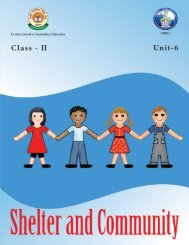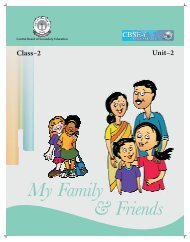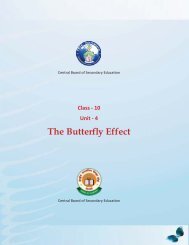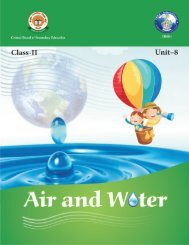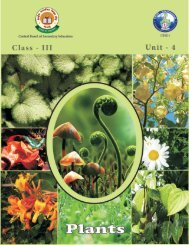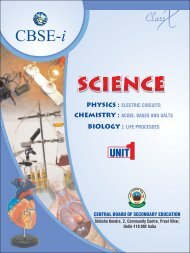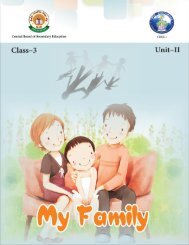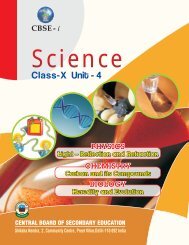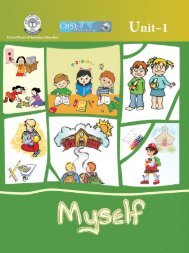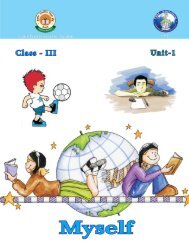transport Final_(unit 7).indd - New Indian Model School, Dubai
transport Final_(unit 7).indd - New Indian Model School, Dubai
transport Final_(unit 7).indd - New Indian Model School, Dubai
Create successful ePaper yourself
Turn your PDF publications into a flip-book with our unique Google optimized e-Paper software.
Preface<br />
The Curriculum initiated by Central Board of Secondary Education –International (CBSE-i) is a progressive step in making the<br />
educational content and methodology more sensitive and responsive to the global needs. It signifi es the emergence of a fresh thought<br />
process in imparting a curriculum which would restore the independence of the learner to pursue the learning process in harmony with<br />
the existing personal, social and cultural ethos.<br />
The Central Board of Secondary Education has been providing support to the academic needs of the learners worldwide. It has about<br />
11500 schools affi liated to it and over 158 schools situated in more than 23 countries. The Board has always been conscious of the<br />
varying needs of the learners in countries abroad and has been working towards contextualizing certain elements of the learning<br />
process to the physical, geographical, social and cultural environment in which they are engaged. The International Curriculum being<br />
designed by CBSE-i, has been visualized and developed with these requirements in view.<br />
The nucleus of the entire process of constructing the curricular structure is the learner. The objective of the curriculum is to nurture the<br />
independence of the learner, given the fact that every learner is unique. The learner has to understand, appreciate, protect and build<br />
on values, beliefs and traditional wisdom, make the necessary modifi cations, improvisations and additions wherever and whenever<br />
necessary.<br />
The recent scientifi c and technological advances have thrown open the gateways of knowledge at an astonishing pace. The speed<br />
and methods of assimilating knowledge have put forth many challenges to the educators, forcing them to rethink their approaches<br />
for knowledge processing by their learners. In this context, it has become imperative for them to incorporate those skills which will<br />
enable the young learners to become ‘life long learners’. The ability to stay current, to upgrade skills with emerging technologies, to<br />
understand the nuances involved in change management and the relevant life skills have to be a part of the learning domains of the<br />
global learners. The CBSE-i curriculum has taken cognizance of these requirements.<br />
The CBSE-i aims to carry forward the basic strength of the <strong>Indian</strong> system of education while promoting critical and creative thinking<br />
skills, effective communication skills, interpersonal and collaborative skills along with information and media skills. There is an inbuilt<br />
fl exibility in the curriculum, as it provides a foundation and an extension curriculum, in all subject areas to cater to the different pace<br />
of learners.<br />
The CBSE has introduced the CBSE-i curriculum in schools affi liated to CBSE at the international level in 2010 and is now introducing<br />
it to other affi liated schools who meet the requirements for introducing this curriculum. The focus of CBSE-i is to ensure that the learner<br />
is stress-free and committed to active learning. The learner would be evaluated on a continuous and comprehensive basis consequent<br />
to the mutual interactions between the teacher and the learner. There are some non-evaluative components in the curriculum which<br />
would be commented upon by the teachers and the school. The objective of this part or the core of the curriculum is to scaffold the<br />
learning experiences and to relate tacit knowledge with formal knowledge. This would involve trans-disciplinary linkages that would<br />
form the core of the learning process. Perspectives, SEWA (Social Empowerment through Work and Action), Life Skills and Research<br />
would be the constituents of this ‘Core’. The Core skills are the most signifi cant aspects of a learner’s holistic growth and learning<br />
curve.<br />
The International Curriculum has been designed keeping in view the foundations of the National Curricular Framework (NCF 2005)<br />
and the experience gathered by the Board over the last seven decades in imparting effective learning to millions of learners, many of<br />
whom are now global citizens.<br />
The Board does not interpret this development as an alternative to other curricula existing at the international level, but as an exercise<br />
in providing the much needed <strong>Indian</strong> leadership for global education at the school level. The International Curriculum would evolve<br />
on its own, building on learning experiences inside the classroom over a period of time. The Board while addressing the issues of<br />
empowerment with the help of the schools’ administering this system strongly recommends that practicing teachers become skillful<br />
learners on their own and also transfer their learning experiences to their peers through the interactive platforms provided by the<br />
Board.<br />
I profusely thank Shri G. Balasubramanian, former Director (Academics), CBSE, Ms. Abha Adams and her team and Dr. Sadhana<br />
Parashar, Head (Innovations and Research) CBSE along with other Education Offi cers involved in the development and implementation<br />
of this material.<br />
The CBSE-i website has already started enabling all stakeholders to participate in this initiative through the discussion forums provided<br />
on the portal. Any further suggestions are welcome.<br />
Vineet Joshi<br />
Chairman




